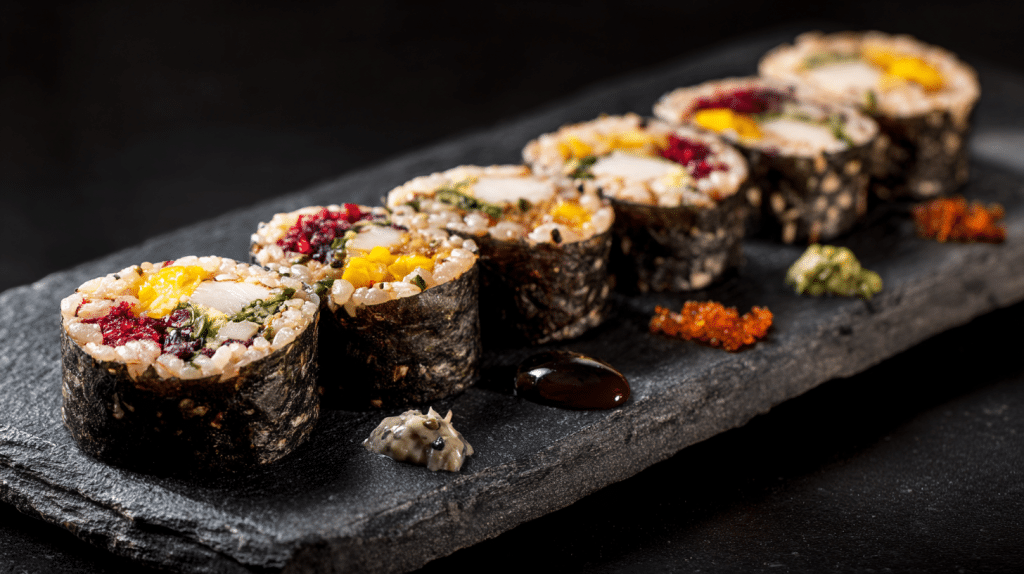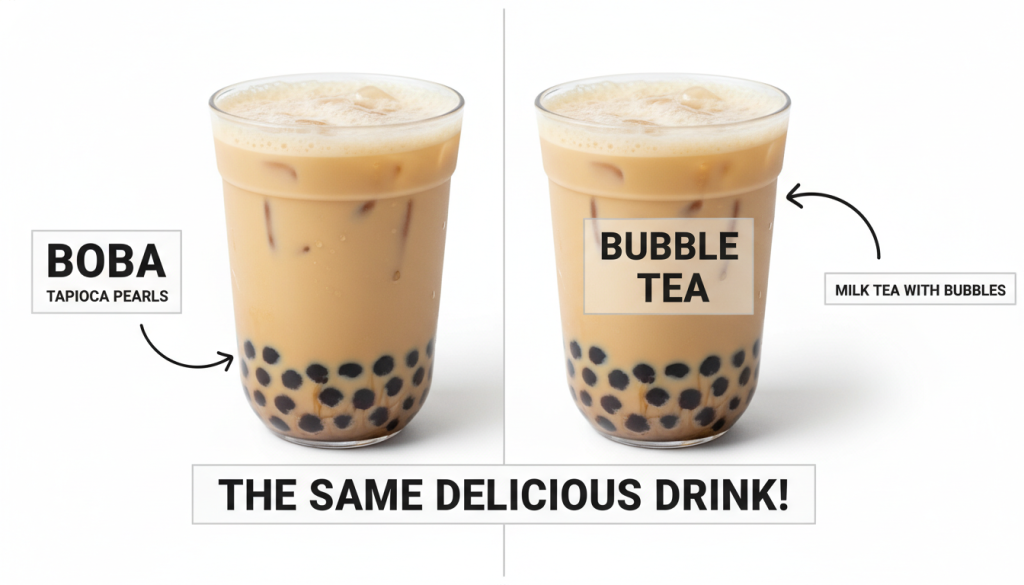Creating sushi at home doesn’t have to mean sacrificing nutrition for taste. Brown rice sushi offers the perfect solution for health-conscious food lovers who crave authentic Japanese flavors.
This wholesome twist on traditional sushi combines the nutty richness of brown sushi rice with fresh vegetables and proteins.
The result is a satisfying meal that delivers both the familiar taste of sushi and the added benefits of whole grains.
Unlike white rice versions, brown rice sushi provides more fiber, vitamins, and minerals while maintaining that signature tangy-sweet flavor you love.
If you’re hosting a dinner party or preparing a family meal, this recipe changes ordinary ingredients into restaurant-quality rolls that everyone will enjoy.
What Is Brown Rice Sushi?
Brown rice sushi represents a healthier approach to the beloved Japanese dish by substituting nutrient-dense brown rice for traditional white rice.
This simple swap maintains the authentic sushi experience while adding substantial nutritional value.
The key difference lies in the rice processing. Brown sushi rice retains its bran and germ layers, which provide essential nutrients, fiber, and a distinctive nutty flavor that complements various fillings well.
Ingredients for Your RecipeFor Brown Sushi Rice:
For Sushi Rolls:
|
Recipe Notes & Prep Info
The following table provides essential recipe information to help you plan your brown rice sushi preparation effectively.
| Information | Details |
|---|---|
| Prep Time | 20 minutes |
| Cook Time | 40 minutes |
| Total Time | 60 minutes |
| Servings | 4 rolls (28 pieces) |
| Weight per Serving | 270g |
| Difficulty | Intermediate |
| Cuisine | Japanese Fusion |
This recipe yields four complete sushi rolls, with each roll providing approximately seven pieces when appropriately sliced with a sharp knife.
Step-by-Step Brown Rice Sushi Instructions
Follow these detailed steps to create perfect brown rice sushi that rivals your favorite restaurant’s quality and presentation.
Step 1: Preparing the Brown Sushi Rice
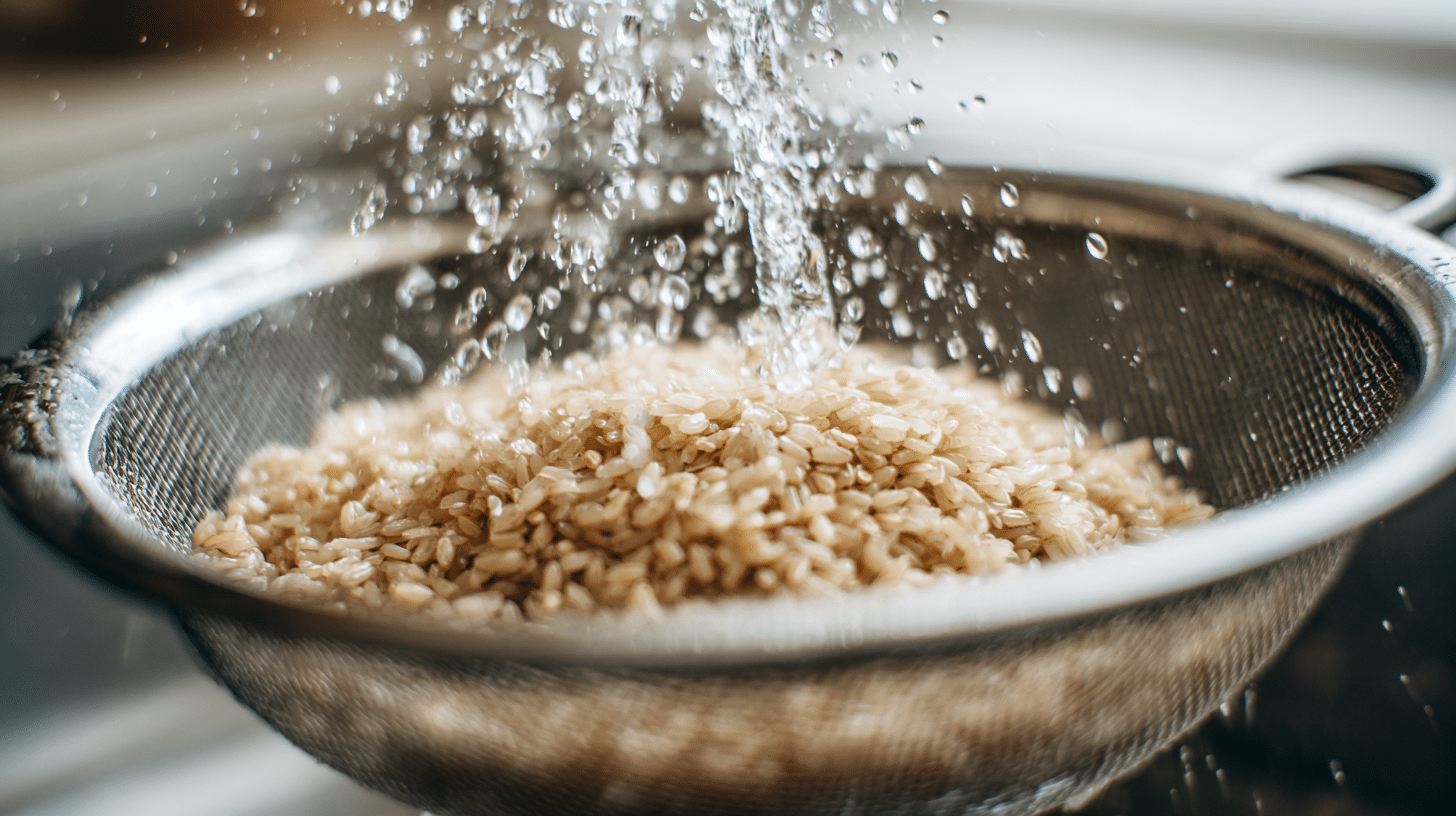
Start by rinsing the brown rice under cold water until the water runs clear, which removes excess starch and prevents a clumpy texture.
Combine the rinsed rice with water in a heavy-bottomed saucepan, adding the kombu if using for extra umami flavor.
Bring the mixture to a boil, then reduce the heat to low, cover tightly, and simmer for 35-40 minutes until the rice is tender and the water is absorbed.
Remove from heat and let stand covered for 10 minutes to complete the steaming process.
Pro Tip: Use a 1:1.5 rice-to-water ratio for perfectly cooked brown rice that isn’t too dry or mushy.
Step 2: Creating the Seasoning Mixture

While the rice rests, prepare the sushi seasoning by combining rice vinegar, sugar, and salt in a small saucepan. Heat gently while stirring until the sugar and salt dissolve completely, creating a smooth mixture.
Allow this seasoning to cool slightly before adding it to the cooked rice. The warm seasoning will distribute more evenly throughout the grain, ensuring consistent flavor in every bite.
Pro Tip: Make extra seasoning and store it in the refrigerator for up to one month for quick future sushi preparations.
Step 3: Seasoning and Cooling the Rice
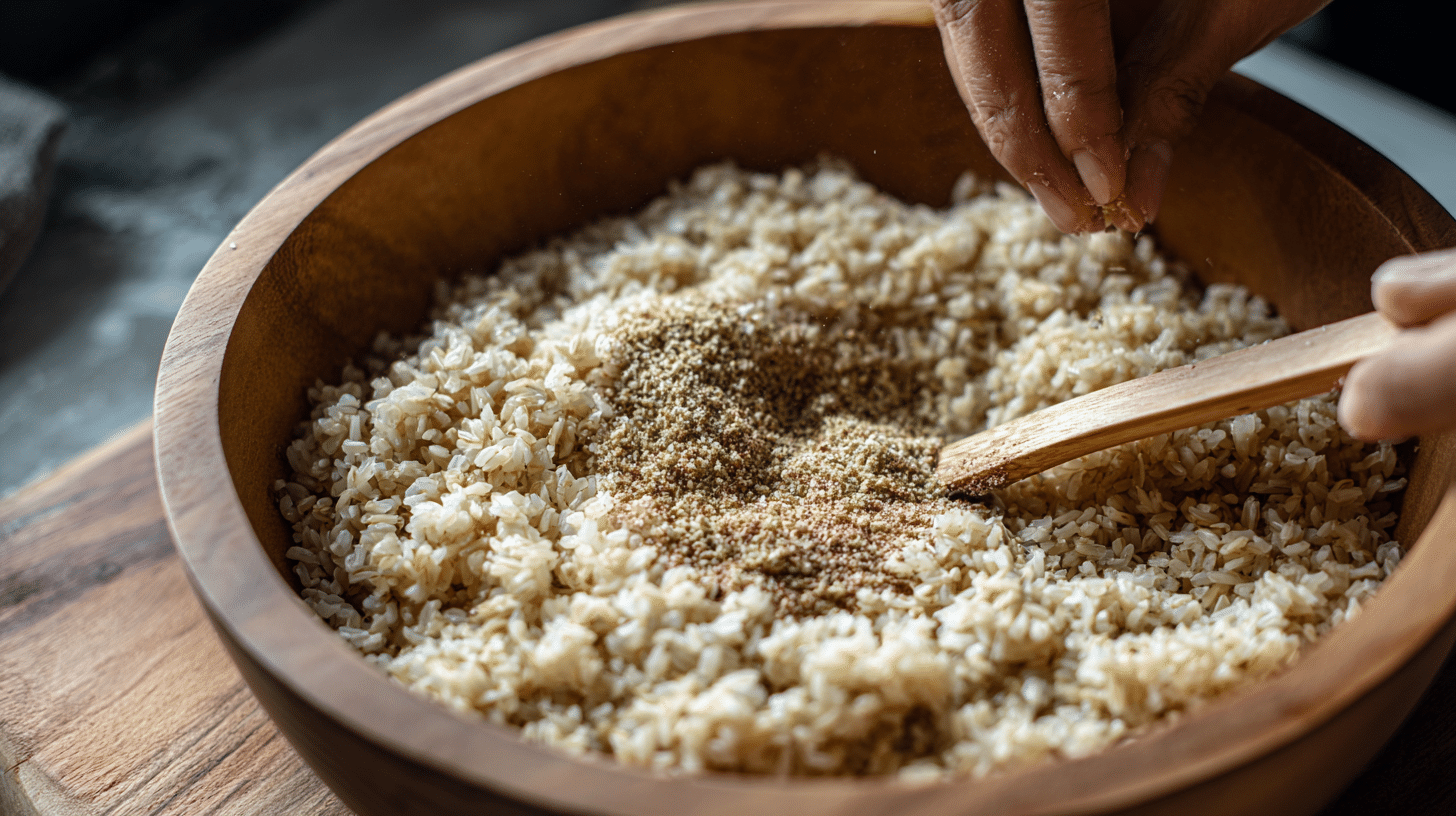
Transfer the cooked brown rice to a large, shallow bowl and gradually add the seasoning mixture while gently folding with a wooden spoon or rice paddle.
Use cutting motions rather than stirring to prevent breaking the grains and creating a mushy texture.
Fan the rice while folding to help it cool to room temperature more quickly. Properly seasoned brown sushi rice should have a subtle tangy-sweet flavor and slightly sticky consistency that holds together when pressed.
Pro Tip: A hair dryer on cool setting works perfectly for quickly cooling the rice while you fold in the seasoning.
Step 4: Preparing Fresh Fillings
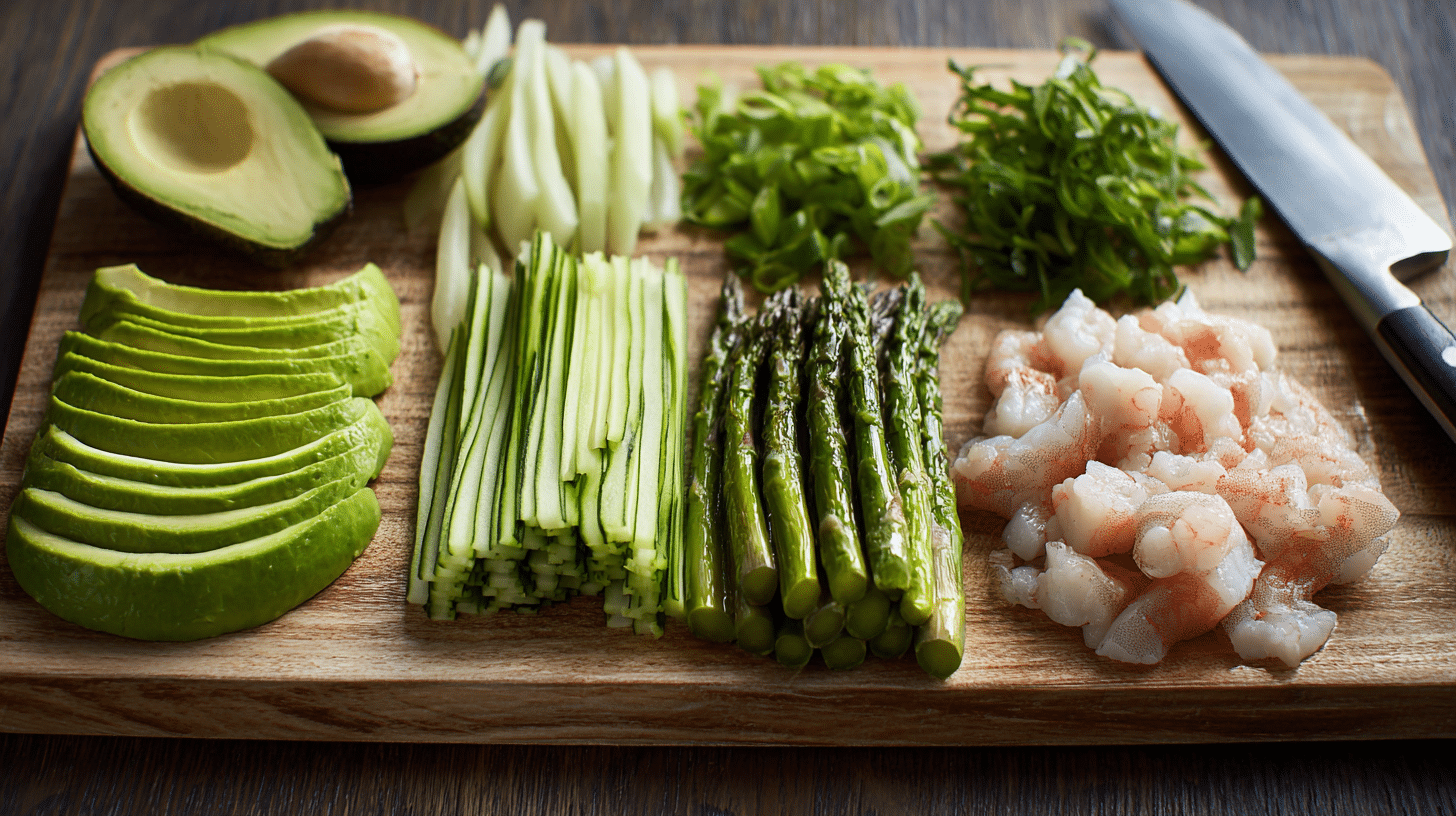
Wash and prepare all vegetables while the rice cools, cutting them into uniform strips about the length of the nori sheets.
Blanch asparagus in boiling water for 2-3 minutes until bright green and crisp-tender, then plunge into ice water to stop cooking.
Pat all vegetables dry with paper towels to prevent excess moisture from making the rolls soggy. Slice the avocado just before assembling to maintain freshness and to avoid browning.
Pro Tip: Keep cut vegetables in separate bowls lined with paper towels to absorb excess moisture and maintain crispness.
Step 5: Assembling Your Sushi Rolls
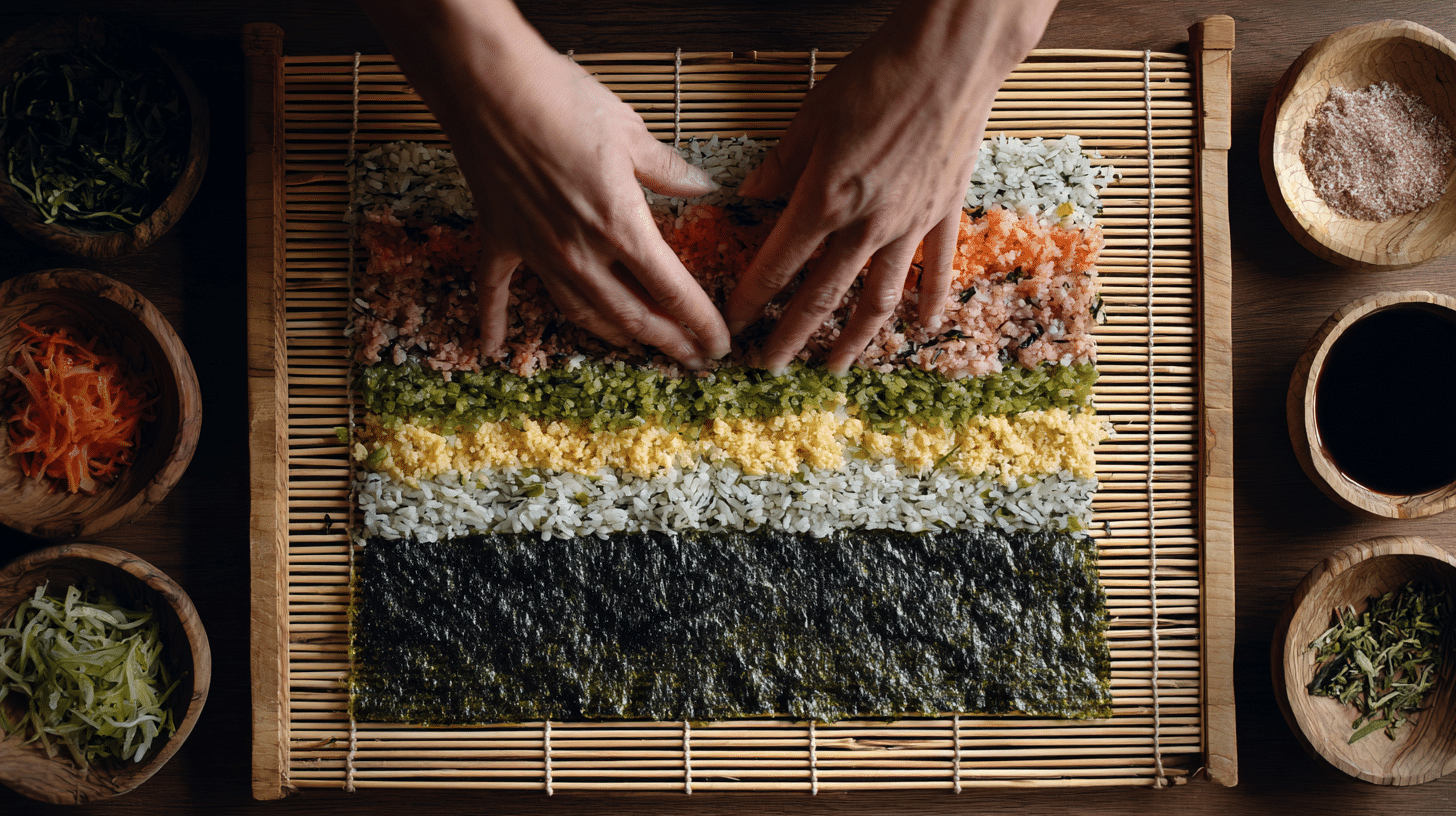
Place a bamboo sushi mat on your work surface and lay one nori sheet shiny side down with the rough side facing up.
Wet your hands with water to prevent sticking, then spread about ¾ cup of seasoned brown sushi rice evenly across the nori, leaving a 1-inch border at the top edge.
Press gently to create an even layer without compacting the rice too firmly. Arrange your chosen fillings in a horizontal line across the bottom third of the rice, being careful not to overfill.
Pro Tip: Keep a bowl of water mixed with a splash of rice vinegar nearby for dipping your hands to prevent rice from sticking.
Step 6: Rolling and Finishing Techniques
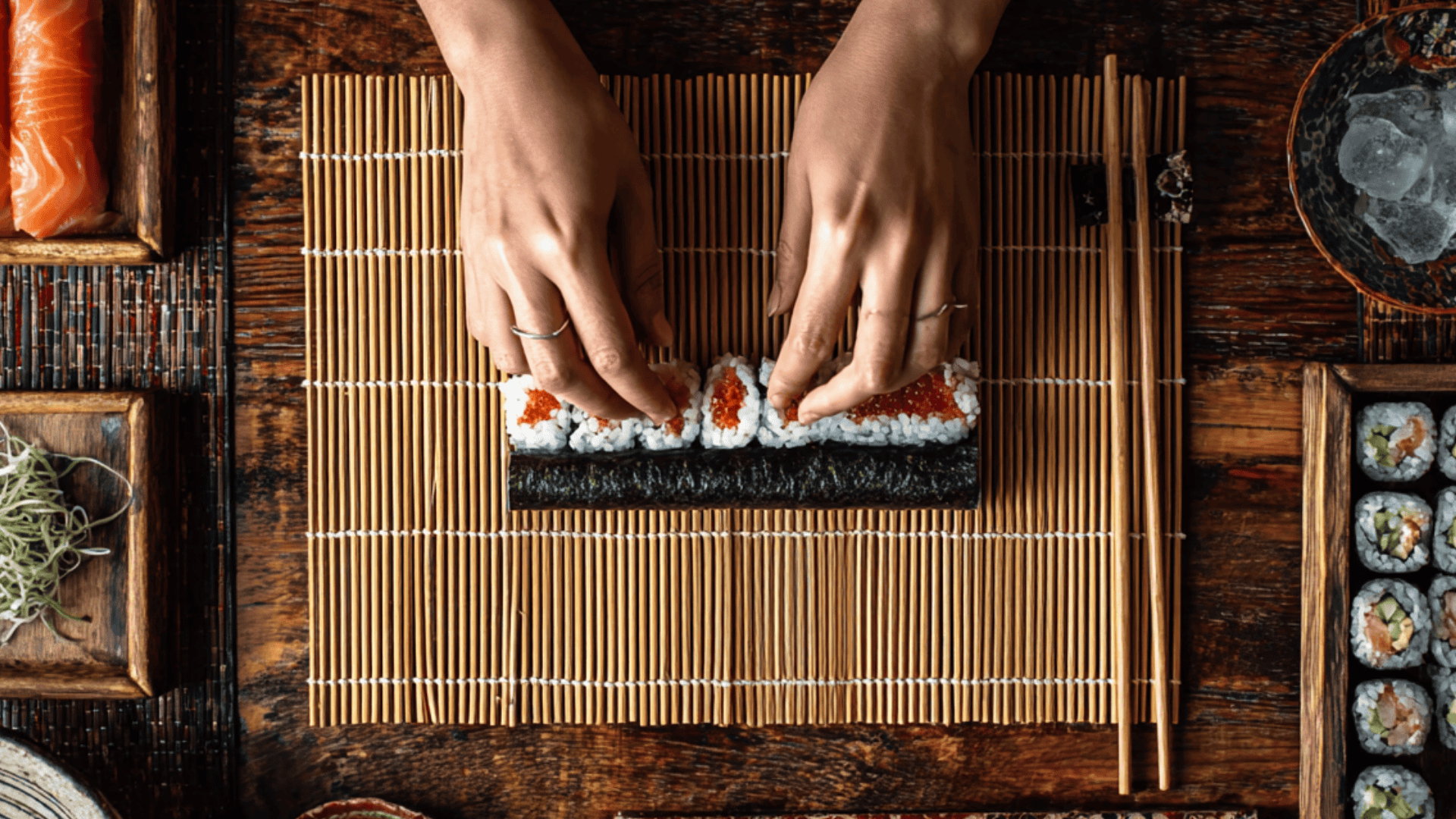
Using the bamboo mat as a guide, lift the bottom edge and roll the nori over the fillings, applying gentle pressure to create a tight cylinder.
Continue rolling while pulling the mat away from the roll to prevent it from getting trapped inside. Seal the edge by moistening the exposed nori strip with a damp finger and pressing gently.
Use a sharp knife dipped in water to slice each roll into 6-8 pieces, cleaning the blade between cuts to ensure clean edges and attractive presentation.
Pro Tip: Use a sawing motion when cutting rather than pressing straight down to avoid squashing the rolls and maintain perfect round shapes.
Nutritional Information
Understanding the nutritional profile of your brown rice sushi helps you make informed dietary choices while enjoying this healthy meal option.
The following nutritional information reflects average values per serving and may vary based on specific ingredients and portion sizes used in preparation.
| Nutrient | Amount per Serving (270g) |
|---|---|
| Calories | 430 kcal |
| Protein | 12g |
| Carbohydrates | 68g |
| Total Fat | 10g |
| Dietary Fiber | 7g |
| Sodium | 575mg |
| Sugar | 8g |
Note: Nutritional values are approximate and may vary based on specific ingredients and preparation methods used. Consult with a healthcare provider for personalized dietary advice.
Brown Rice Sushi Variations
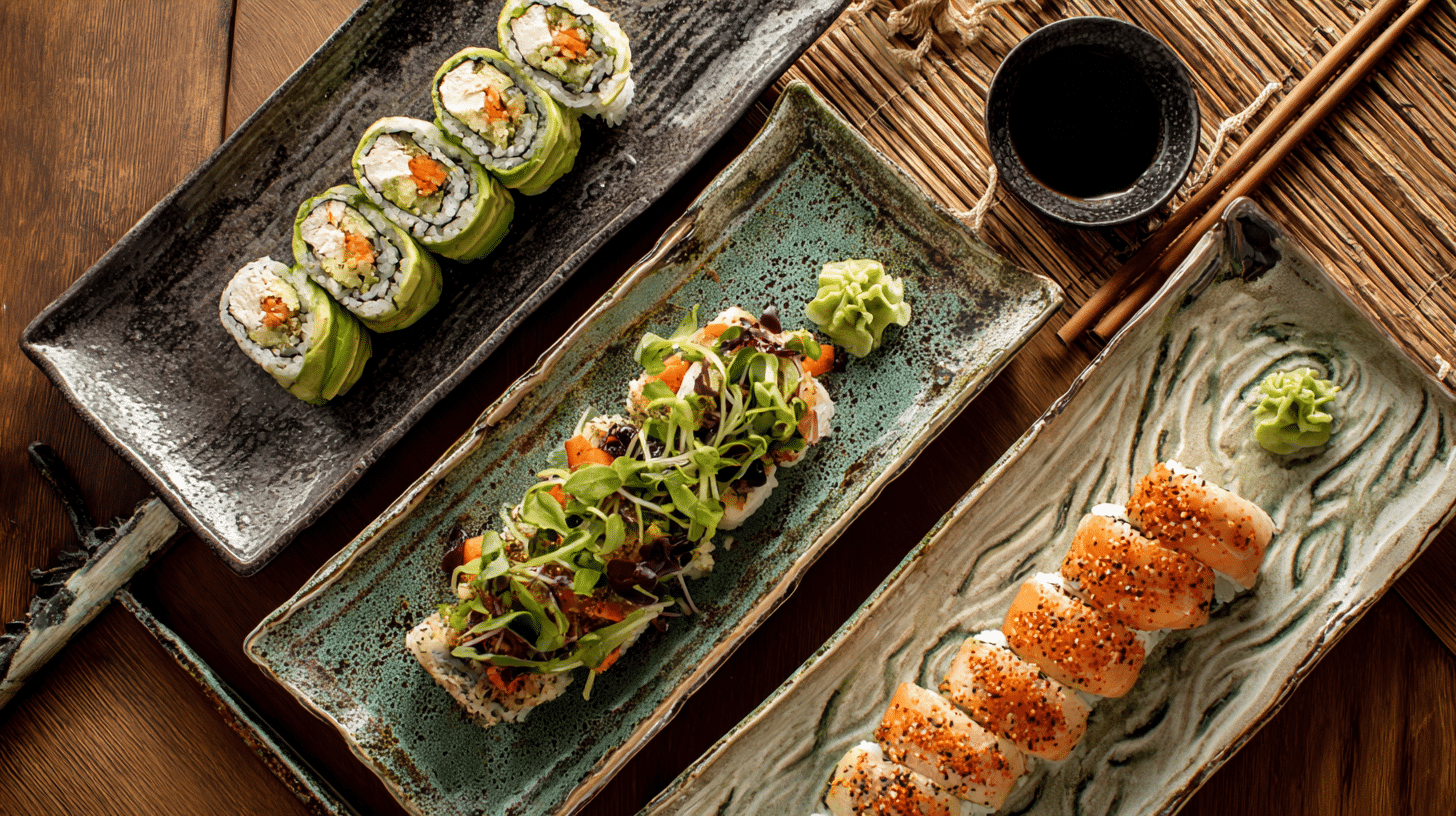
Try these popular variations to expand your sushi repertoire and cater to different taste preferences and dietary requirements.
1. California-Style Roll
This classic American-style roll combines creamy avocado with refreshing cucumber and sweet crab flavors. The familiar combination makes it perfect for sushi beginners or those preferring milder tastes.
- Imitation crab, cucumber, avocado
- Sesame seeds for garnish
2. Vegetarian Garden Roll
A fresh, plant-based option that celebrates crisp vegetables and natural flavors. This roll provides excellent nutrition while maintaining satisfying texture contrasts that appeal to all diners.
- Cucumber, avocado, sprouts, carrots
- Optional: pickled vegetables
3. Spicy Salmon Roll
For those who enjoy heat with their sushi, this variation combines flaky salmon with creamy spicy mayo. The cucumber adds cooling contrast while the sriracha provides an extra kick of flavor.
- Cooked salmon, cucumber, spicy mayo
- Sriracha drizzle on top
| Nutrient | California | Vegetarian | Spicy Salmon |
|---|---|---|---|
| Calories | 420 kcal | 380 kcal | 450 kcal |
| Protein | 14g | 8g | 18g |
| Carbs | 65g | 70g | 62g |
| Fat | 12g | 8g | 14g |
Note: Nutritional values are approximate and may vary based on specific ingredients and preparation methods.
Serving Suggestions and Pairings
Presenting your brown rice sushi attractively improves the dining experience and showcases your culinary skills to family and guests.
Arrange sliced rolls on a clean serving platter with small bowls of soy sauce, wasabi, and pickled ginger alongside.
Consider adding edamame, miso soup, or seaweed salad to create a complete Japanese-inspired meal.
Green tea or sake complements the flavors beautifully for adult diners, while sparkling water with cucumber provides a refreshing non-alcoholic option.
Your Healthy Sushi Success Story Starts Here
Creating homemade brown rice sushi proves that healthy eating doesn’t require sacrificing flavor or satisfaction.
This nutritious alternative to traditional white rice sushi delivers the authentic taste you crave while providing additional fiber, vitamins, and minerals your body needs.
The nutty flavor of brown sushi rice pairs beautifully with fresh vegetables and proteins, creating rolls that are both delicious and nourishing.
If you’re preparing a special dinner for loved ones or cruising through new cooking skills, this recipe offers endless possibilities for customization and creativity.
Ready to roll your way to healthier eating? Gather your ingredients and start making brown rice sushi tonight!







